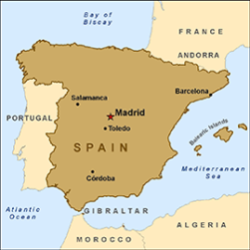Spainish Online Slots Regulation More Of A Priority Than Poker

Despite Spain, France and Italy’s ring fenced online poker industry struggling through a lack of player liquidity, a pan-European online poker market is unlikely to open up anytime soon with the most recent summit of gaming regulators held at the beginning of this year in Rome failing to produce a breakthrough on sharing liquidity between regulated EU markets.
The fact that a huge proportion of European players gamble on unregulated poker sites, including 40% in Spain according to an eGaming Review, seems not to trouble the country’s gambling authority, which has indicated its chief priority for now was to expand its regulated online gaming market by adding online slot machines to its current offering of sports book, poker, and casino products.
Commenting on the situation, DLA Piper Spain partner, Albert Agustinoy Guilayn, explained: “Spain’s authority is currently dealing with the regulation of slots and the future reopening of the market..My perception is that this [shared liquidity] is not going to happen during the course of this year and it is more likely to happen during 2015.”
Spanish online poker on rocky ground
Since Spain issued its first internet gaming licences in June 2012, the country’s online gambling industry has steadily declined and from Q1 to Q3 2013 reported a dramatic 20% fall in revenues.
Ahead of regulation many of the world’s top gambling and poker brands, which had previously operated in Spain’s grey market, were prepared to fork out millions of euros in “retrospective” taxes so as to obtain an operating licences. One such company was Bwin.Party which shelled out €25.6 million to gain entry to the Spainish market. Many of those businesses are currently wondering whether the effort was worth their time, especially with PokerStars.es controlling around 70% of the market with a seven-day average of 1,450 players. By contrast, last week PartyPoker.es was showing only 85 registered cash game players over a week, while last year other gambling businesses, including the Ongame Network and Paf.com took the decision to cut their losses and withdraw from Spain’s market all together.
High taxation a huge put off
In addition to a restrictive player pool, another huge factor limiting profitability has been the heavy 25% tax on gross gaming revenue imposed on operators by Spain. In the regulated market’s first year of operation, for instance, a Jdigital-commissioned report found the country’s licensed egaming businesses generated a total of €234 million in gross gaming revenues, but still reported a combined net loss of €72.5 million over the same period, mostly thanks to a high tax burden imposed by the state.
Commenting on the cost of Spain’s high taxation in terms of missed investments, Albert Agustinoy Guilayn speaking to PokerNews, said: “Taxation is high and, particularly in the case of poker, it is a little tricky as well..it is really difficult to quantify how many operators have walked away from the Spanish market as a consequence of taxation..still, at the end of the day, I think it’s something quite burdensome for an operator which has managed its activities in a deregulated market as it used to be the global “.com” one.”
Gambling in Spain on the decline
Presently, Spanish regulators have published two draft decree regulations on online slot machines and exchange betting, with a public-consultation period now open until March 27th, during which time interested parties can file comments on the draft regulations.
The same 25% tax on gross gaming revenue policy may also deter other operators from trying to obtain slots licences when they become available. Furthermore, Spain’s gambling industry, both online and land-based, continues to decline each quarter, with a report financed by Madrid-based gambling operator Codere showing the percentage of leisure spending by Spanish gamblers had fallen from 9.4% to 7.7% last year.
Overall, Spain’s land-based casino revenues have fallen from €2.5 billion in 2007 to €1.5 billion in 2012, while the country’s online gaming market declined by 10% to €55.4 million month-on-month, for the three months ending June 2013. Sports betting represented 48.4% of total quarterly revenues, but this sector also reported a drop in revenues of 13% to €26.8 million.
The Spanish economy has been in free-fall since the financial crisis of 2008, with youth unemployment running at an astounding 50%. Needless to say, if Spain is hoping to attract significant interest from global online gambling operators in order to help prop up its ailing economy, then the country will have to work harder in order to make its languishing online gambling market as enticing as possible.







